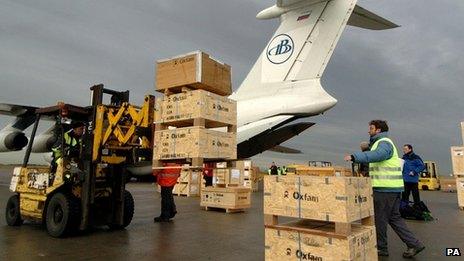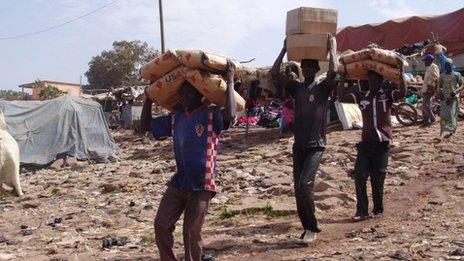'Building an army can be aid too'
- Published

Charities have expressed dismay at the proposals to switch aid money
The aid lobby has expressed its outrage at the possibility that British aid money could be switched to defence spending.
Prime Minister David Cameron said the government was ready to consider spending money from the aid budget on peacekeeping and other defence-related operations.
"We think the British public expect [the aid budget] to be spent on hospitals, and not helicopter gunships," said the head of policy at the aid agency Oxfam.
And the chairman of the parliamentary international development committee, Malcolm Bruce, said: "You can't use the aid budget to make up for defence cuts."
But although few people in the world of international development would favour spending money on guns rather than vaccines for children, there are places where "aid" and "security" overlap.
In The UK's case the classic example is Sierra Leone.
After intervening to end the decade-long rebel war there in 2000, the British Army began retraining the Sierra Leonean armed forces.
A senior British officer said at the time: "We're going to rebuild this country from the army up."
Great success
The thinking was that there would never be any meaningful development in Sierra Leone until a strong army, answerable to a democratically-elected government, was in place. The rebels would have to be defeated or integrated into the new army and an accountable police force would have to be formed too.
By and large it's been a great success.
The newly-secure, post-war Sierra Leone has attracted considerable foreign investment and the government has been credited with a big road-building programme.
None of this would have been possible without a secure environment.
Traditional aid workers in Sierra Leone argue that some of the improvements there are due to increases in aid and advice to the government in Freetown.
They acknowledge there was a need to rebuild the army but say this was followed up by necessary increases in aid to the health and agriculture sectors too.
The Sierra Leone army has been rebuilt to such an extent that it is now contributing to peacekeeping missions itself.
It is due to send several hundred soldiers to Mali to join an African force expected to be soon "rehatted" as a UN peacekeeping force.
Mali security
Northern Mali was taken over last year by Islamist groups. In January French-led forces expelled most of them - but fierce battles are still taking place in the far north of the country where the French say the Islamists have withdrawn to.

Thousands of troops from France and African nations have been sent to Mali to oust Islamist militants
It is inconceivable that any meaningful aid can be delivered to northern Mali until security is restored there and in the long run that can only be achieved through the government army.
The problem is the army is split in several places. Ethnic Tuareg officers have been expelled for "treason", for example, and a section of the military deemed loyal to a former head of state has rebelled against other units.
The British government has agreed to contribute to up to 40 soldiers to a European Union army training mission totalling several hundred experts.
It will be a highly sensitive mission because the European soldiers will be training Malians directly involved in combat.
Whether the British part of this operation is defined as "aid" or "defence" spending may be the subject of fierce interdepartmental battles in Whitehall.
There are international rules about what can be defined as "official development assistance" or "aid". Certainly, artillery pieces would not be allowed - but some security or defence advice might be.
On the ground in Mali the way the army acts is profoundly important - it has more effect on many Malians than some traditional aid programmes.
Teaching soldiers to act more humanely can affect lives at least as profoundly as distributing food aid.
This is not an argument for switching aid spending to defence spending. But building a decent army is a prerequisite of development.
- Published21 February 2013